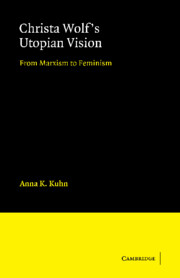Book contents
- Frontmatter
- Contents
- Acknowledgments
- List of abbreviations
- 1 Introduction: setting the context
- 2 Beginnings: experimentation with Socialist Realist paradigms
- 3 Christa T.: the quest for self-actualization
- 4 Patterns of Childhood: the confrontation with the self
- 5 No Place on Earth: revision of the Romantic heritage
- 6 Cassandra: myth, matriarchy, and the canon
- 7 In lieu of a conclusion. Störfall: the destruction of utopia?
- Notes
- Bibliography
- Index
3 - Christa T.: the quest for self-actualization
Published online by Cambridge University Press: 18 September 2009
- Frontmatter
- Contents
- Acknowledgments
- List of abbreviations
- 1 Introduction: setting the context
- 2 Beginnings: experimentation with Socialist Realist paradigms
- 3 Christa T.: the quest for self-actualization
- 4 Patterns of Childhood: the confrontation with the self
- 5 No Place on Earth: revision of the Romantic heritage
- 6 Cassandra: myth, matriarchy, and the canon
- 7 In lieu of a conclusion. Störfall: the destruction of utopia?
- Notes
- Bibliography
- Index
Summary
This coming-to-oneself – what is it?
Johannes R. BecherDivided Heaven established Christa Wolf as a writer of note in the GDR; her second book, Nachdenken über Christa T. (The Quest for Christa T., 1968) secured her position in the West. Of all Wolf's works, Christa T. has been the most heatedly debated, especially in the Federal Republic. The limited first edition of the work and its negative reception in the GDR doubtless contributed to its success in the West, where critics read it as a statement of political dissent. In the symptomatic (if overstated) phrase of Marcel Reich-Ranicki, “Christa T. dies of leukemia, but her real sickness is the GDR.” While noting the more personal tone of Christa T., most critics in both countries interpreted it and its successor, Kindheitsmuster (Patterns of Childhood, 1976) in the political context of GDR literature.
GDR critics, committed to thematic concerns and the mimetic theory of realism, responded negatively to Wolf's experimentation with perspective and narrative form. In the Federal Republic, the evaluation of Christa T. was almost the inverse of that of Divided Heaven. What critics in both East and West Germany did agree on was that Christa T. was an anomaly, in terms of both GDR literature and Christa Wolf's previous work.
- Type
- Chapter
- Information
- Christa Wolf's Utopian VisionFrom Marxism to Feminism, pp. 51 - 95Publisher: Cambridge University PressPrint publication year: 1988



